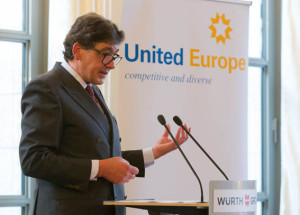By Manfred Kurz
From a historic point of view, it is hardly surprising that a union goes through a very critical phase six decades after its foundation. Political unions form only slowly and gradually. The United States, for instance, had experienced growing wealth and a relative political stability for seven decades before a civil war broke out in which half a million people lost their lives.

Photo: Marc Darchinger
It was only after the Civil War that the United States adopted a single currency. And it was only in the 20th century that Americans developed a national identity that was stronger than their bond to the respective federal states. Economic and political unification processes in Germany and Switzerland were similarly long and complex.
It is no wonder, then, that Europe’s integration project has not yet reached the point of no return, no matter what some people in Brussels seem to think. It is possible that the European Union will emerge strong and unified from the sovereign debt crisis and the related political setbacks. Perhaps it really will succeed in creating the financial and the fiscal institutions necessary for a sustained economic recovery.
A deeper integration could have an impact on other areas, too, such as Europe’s foreign and security policy. This would give the European Union a chance to strengthen its role in the world. Yet failure is also possible. Has the European integration project hit its peak? Will the European Union experience creeping demolition in the years to come?
There is a lot at risk. In my opinion, the central issue is growth. Only the economy – that is only private businesses – can win this game. At a time when the European integration project is in danger of failing, it becomes all the more necessary to unleash the powers of the economy from excessive regulation and geographical boundaries.
In this context, let us take a look at the British debate. Prime Minister David Cameron is pressing for reforms in the European Union that would effectively toughen up all member states, making us more able to meet global economic challenges. We should not cherish any illusions: the world will not wait for Europe. On the contrary, we have to watch out that we do not drop behind.
This also wholeheartedly agree with Cameron’s demand to transfer authority back from Brussels to the member states wherever there no cross-border implications. We also need to cut down on bureaucracy. Overall, European policymakers would be well advised to make at least as much of an effort to keep Great Britain inside the European Union as they did to maintain Greece as a member of the Euro zone.
Manfred Kurz, representative of the Würth group in Berlin and Brussels, held this speech at a United Europe event which he hosted on July 16, 2015. The Würth group also supports United Europe as a company member.


